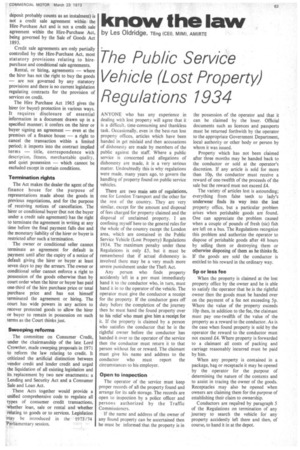know the law
Page 61

If you've noticed an error in this article please click here to report it so we can fix it.
by Les Oldridge, TEng (CEI), MIMI. AMIRTE
The Public Service Vehicle (Lost Property) Regulations 1934
ANYONE who has any experience in• dealing with lost property will agree that it is a difficult, time-consuming and thankless task. Occasionally, even in the best-run lost property offices, articles which have been handed in get mislaid and then accusations of dishonesty are made by members of the public against the staff. Where a public service is concerned and allegations of dishonesty are made, it is a very serious matter. Undoubtedly this is why regulations were made, many years ago, to govern the handling of property found on public service vehicles.
There are two main sets of regulations, one for London Transport and the other for the rest of the country. They are very similar, except for the amount and disposal of fees charged for property claimed and the disposal of unclaimed, property. I am confining myself here to the general rules for the whole of the country except the London area, which are contained in the Public Service Vehicle (Lost Property) Regulations 1934. The maximum penalty under these Regulations is only £5, but it must be remembered that if actual dishonesty is involved there may be a very much more severe punishment under the Theft Act.
Any person who finds property accidently left in a psv must immediately hand it to the conductor who, in turn, must hand it in to the operator of the vehicle, The operator must give the conductor a receipt for the property. If the conductor goes off duty before the completion of the journey then he must hand the found property over to his relief who must give him a receipt for it. If the property is claimed by a person who satisfies the conductor that he is the rightful owner before the conductor has handed it over to the operator of the service then the conductor must return it to that person without fee or reward. The claimant must give his name and address to the conductor who must report the circumstances to his employer.
Open to inspection The operator of the service must keep proper records of all the property found and arrange for its safe storage. The records are open to inspection by a police officer and persons authorized by the Traffic Commissioners.
If the name and address of the owner of any found property can be ascertained then he must be informed that the property is in the possession of the operator and that it can be claimed by the loser. Official documents such as licences and passports must be returned forthwith by the operator to the appropriate Government Department, local authority or other body or person by whom it was issued.
Property which has not been claimed after three months may be handed back to the conductor or sold at the operator's discretion. If any article is sold for more than lap, the conductor must receive a reward of one-twelfth of the proceeds of the sale but the reward must not exceed £4.
The variety of articles lost is astounding; everything from false teeth to lady's underwear finds its way into the lost property office, but a particular problem arises when perishable goods are found. One can appreciate the problem caused when a couple of pounds of fresh (sic) fish are left on a bus. The Regulations recognize this problem and authorize the operator to dispose of perishable goods after 48 hours by selling them or dsstroying them or otherwise disposing of them as he thinks fit. If the goods are sold the conductor is entitled to his reward in the ordinary way.
5p or less fee When the property is claimed at the lost property office by the owner and he is able to satisfy the operator that he is the rightful owner then the goods must be handed over on the payment of a fee not exceeding 5p. Where the value of the property exceeds 10p then, in addition to the fee, the claimant must pay one-twelfth of the value of the property as a reward to the conductor. As is the case when found property is sold by the operator the reward to the conductor must not exceed £4. Where property is forwarded to a claimant all costs of packing and carriage reasonably incurred must be paid by him.
When any property is contained in a package, bag or receptacle it may be opened by the operator for the purpose of determining the nature of the contents and to assist in tracing the owner of the goods. Receptacles may also be opened when owners are claiming them for the purpose of establishing their claim to ownership.
Conductors are required by paragraph 5 of the Regulations on termination of any journey to search the vehicle for any property accidently left there and then, of course, to hand it in at the depot.












































































































